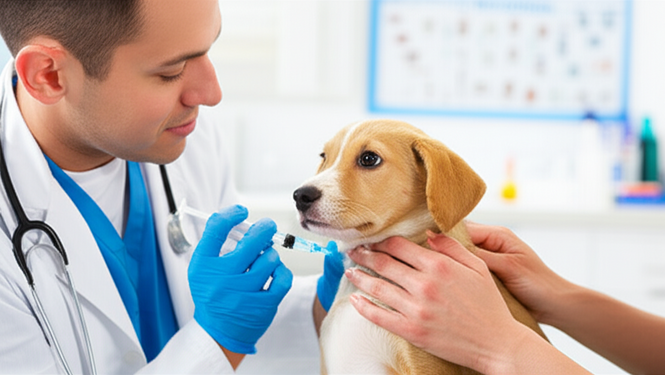Initial Puppy Vaccination Schedule
Core puppy vaccinations protect against several serious diseases. The initial schedule typically begins at 6-8 weeks of age (American Kennel Club). The first round usually includes Distemper, Hepatitis, Parainfluenza, and Parvovirus (often combined into a single injection called DHPP) (VCA Animal Hospitals). A booster is administered every 2-4 weeks until the puppy reaches 16 weeks of age (American Veterinary Medical Association). The Rabies vaccine is typically given between 12-16 weeks (American Kennel Club). Consult your veterinarian to determine the best vaccination schedule for your individual puppy based on their lifestyle, breed, and overall health. For more information on dog care, visit Best Dog Care Tips.
Protecting Your Pup: Benefits of Early Vaccination
Early vaccination is crucial for protecting puppies from preventable diseases. A puppy’s immune system isn’t fully developed until several weeks after birth, leaving them vulnerable to infections (American Kennel Club). Maternal antibodies, passed through the mother’s milk, provide some initial protection, but this wanes over time. Early vaccinations stimulate the puppy’s immune system to produce its own antibodies against specific diseases, creating a crucial line of defense (World Small Animal Veterinary Association). These vaccines typically protect against highly contagious and potentially fatal diseases like parvovirus, distemper, and canine hepatitis (American Veterinary Medical Association). A consistent vaccination schedule, as advised by a veterinarian, is essential for building and maintaining optimal immunity throughout your dog’s life. It ensures comprehensive protection, minimizing the risk of contracting these diseases and contributing significantly to long-term well-being. For more information on house training your puppy, visit this guide.
Navigating the Vaccination Process
Navigating your puppy’s first vaccination appointment can feel overwhelming, but with adequate preparation, it can be a smooth experience. Before the visit, gather necessary documents like your puppy’s health records and any adoption paperwork (American Veterinary Medical Association). Prepare a list of questions for your vet, including breed-specific health concerns (World Small Animal Veterinary Association). Having a carrier and familiar toys can help reduce your puppy’s stress during transport (VCA Animal Hospitals).
During the appointment, the vet will conduct a thorough physical exam (American Veterinary Medical Association). Be prepared to discuss your puppy’s diet, behavior, and any observed health issues (Today’s Veterinary Practice). After administering the vaccines, the veterinarian will explain the vaccination schedule and potential side effects, which can include mild fever or soreness (American Kennel Club). Post-visit, monitor your puppy for any unusual reactions and provide a comfortable, quiet environment for rest (The Spruce Pets). Don’t hesitate to contact your vet if you have any concerns. For more information on puppy care, visit our comprehensive guides on topics such as house training here and socialization here.
Common Concerns and Side Effects
It’s natural to feel some anxiety about potential side effects from puppy vaccinations. Mild reactions are common and typically resolve quickly. These can include soreness at the injection site, a slight fever, or decreased appetite (American Kennel Club). Less frequently, more serious side effects such as vomiting, diarrhea, facial swelling, or hives can occur (VCA Animal Hospitals). While rare, severe allergic reactions are also possible. Always monitor your puppy closely after vaccinations and consult your veterinarian if you notice any concerning symptoms. For a comprehensive guide on puppy care, including vaccination schedules and tips for a healthy start, visit our article on Best Dog Care Tips: How to Care for a Dog Daily. For breed-specific health concerns, our article on Which Dog Breeds Face the Most Health Problems? may provide additional insights.
Beyond the First Shots: Continuing Care
Keeping your puppy healthy requires ongoing care beyond the initial vaccinations. Booster shots are crucial for maintaining immunity against preventable diseases. These boosters reinforce the initial protection provided by puppy vaccines, as immunity can wane over time. Consult your veterinarian to determine the appropriate booster schedule for your puppy’s breed, age, and lifestyle (American Kennel Club). Regular veterinary checkups are essential for monitoring your puppy’s overall health, detecting potential issues early, and receiving personalized guidance (VCA Animal Hospitals). For a deeper understanding of essential dog care practices, explore our comprehensive guide available on this website: Best Dog Care Tips: How to Care for a Dog Daily. This resource provides valuable insights into daily care routines, ensuring your puppy thrives.
Sources
- American Kennel Club – Common Side Effects of Dog Vaccinations
- American Kennel Club – Puppy Shots: A Complete Guide
- American Kennel Club – Vaccinations Your Dog Needs
- American Kennel Club – Why Are Puppy Shots So Important?
- American Veterinary Medical Association – Taking Your Pet to the Veterinarian
- American Veterinary Medical Association – Vaccinations
- DogsCare.life – Best Dog Care Tips: How to Care for a Dog Daily
- DogsCare.life – How to House Train Your Puppy: Your Complete Guide
- DogsCare.life – How to Socialize Your Puppy: A Complete Guide
- DogsCare.life – Which Dog Breeds Face the Most Health Problems?
- The Spruce Pets – Vaccinating Your Puppy
- Today’s Veterinary Practice – Canine Vaccination Protocols: Recommendations for Practitioners
- VCA Animal Hospitals – Dog Vaccinations
- VCA Animal Hospitals – Preparing Your Pet for a Veterinary Visit
- VCA Animal Hospitals – Vaccinations for Dogs
- VCA Animal Hospitals – Vaccinations in Dogs: Potential Side Effects
- World Small Animal Veterinary Association – WSAVA Vaccination Guidelines 2015


